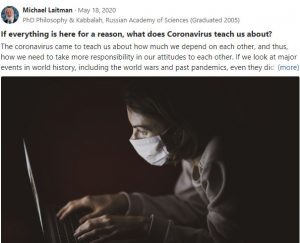
The coronavirus came to teach us about how much we depend on each other, and thus, how we need to take more responsibility in our attitudes to each other.
If we look at major events in world history, including the world wars and past pandemics, even they did not involve the entirety of humanity to the extent that the coronavirus has.
We would thus be wise to learn a lesson in global interdependence from the coronavirus, and step up our game to think and act more responsibly and considerately of each other, treating each other as members of a single human family, with each person holding equal importance.
While we normally consider only our own health, the coronavirus forced us to pay attention to the health of others around us by directly connecting our health to theirs.
We were cornered into upholding a list of conditions in order to not infect others—maintaining personal hygiene, washing hands regularly, staying at home during the lockdown, wearing masks and sustaining a distance of two meters when in public—and as the economy reopens, the period of distancing continues making us think about the health of others, since other people’s good health ensures our good health, and vice versa.
This is one clear way how the coronavirus has taught us a lesson in interdependence.
The question then becomes: How much do we apply this lesson to our lives?
From herein, will we conduct ourselves in such a way where society’s benefit leads our thought processes, or will we resort to prioritizing self-benefit without considering the effect on others, as per our pre-coronavirus habits?
Considering others before we consider ourselves runs against our egoistic human nature, which constantly places ourselves before others.
Yet, as hard as it is for us to think about benefiting others, the coronavirus has shown us how nature can compel us to do so whether we like it or not.
Nature, however, has no intention of making us suffer.
On the contrary, there is immense fulfillment and enjoyment dwelling in nature, which it wants us to discover.
It wants us to develop into all-seeing, all-knowing and all-feeling creatures, and it can do so by elevating us above our self-aimed thoughts and desires.
How? It is by giving us situations where we are forced to better connect in order to survive.
Such pressures are akin to birth contractions. As a baby gets pressured to exit its comfortable-but-narrow world in the womb and enter a new world outside, we too get pressured by events such as the coronavirus to exit our comfortable-but-narrow egoistic perceptions of the world, and enter a new perception of our interdependence.
Moreover, as the baby did not know that its life in the womb was tiny, dark and constrained, we too fail to see how living solely according to the ego’s demands—self-benefit at the expense of others—is a tiny, dark and constrained world in comparison to the world we can discover when we shift our main focus onto benefiting others.
As much as we appreciate and want to have love, peace, truth, happiness, confidence, support, encouragement and care in our lives, we fail to see how such qualities are achievable at a much greater scale when mutual responsibility and consideration becomes a leading value throughout society.
When everyone aims at benefiting everyone, and when we encourage contributing to society as a principle marker of success, instead of increasing our wealth at any cost, then we will experience a harmonious life, balanced with nature, and will feel a new sense of calm spread throughout society, fulfilling us all.
I thus hope that we do take away the lesson of needing to be more responsible and considerate of others, which the coronavirus came to teach us.
We all have a special role in contributing to a society that can make our lives great, and until we take some strides in that direction of our own accord, nature will send us reminders through the likes of many such problems, pandemics among them.
Featured in Quora